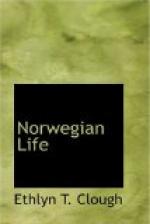In early days Norway consisted of a great number of small states called Fylkis, each a little kingdom by itself. The free peasants in a Fylki held general assemblies called Things, where laws were made and justice administered. No public acts were undertaken without the deliberation of a Thing. The Thing was sacred, and a breach of peace at the thing-place was considered a great crime. At the Thing there was also a hallowed place for the judges, or “lag-men,” who expounded and administered the laws made by the Thing. Almost every crime could be expiated by the payment of fines, even if the accused had killed a person. But if a man killed another secretly, he was declared an assassin and an outlaw, was deprived of all his property, and could be killed by any one who wished to do so. The fine or man-bote was heavier, the higher the rank of the person killed.
The Thing or Fylkis Thing was not made up of representatives elected by the people, but was rather a primary assembly of the free udal-born peasant-proprietors of the district. There were leading men in the fylki, and each fylki had one or more chiefs, but they had to plead at the Thing like other free men. When there were several chiefs, they usually had the title of herse; but when the free men had agreed upon one chief, he was called jarl (earl), or king. The king was the commander in war, and usually performed the judicial functions; but he supported himself upon his own estates, and the free peasants paid no tax. The dignity of the king was usually inherited by his son, but if the heir was not to the liking of the people, they chose another. No man, however clear his right of succession, would think of assuming the title or power of a king except by the vote of the Thing. There he was presented to the people by a free peasant, and his right must be confirmed by the Thing before he could exert any act of kingly power. The king had a number of free men in his service, who had sworn allegiance to him in war and in peace. They were armed men, kept in pay, and were called hird-men or court-men, because they were members of the king’s hird or court. If they were brave and faithful, they were often given high positions of trust; some were made lendermen (liegemen), or managers of the king’s estates.




